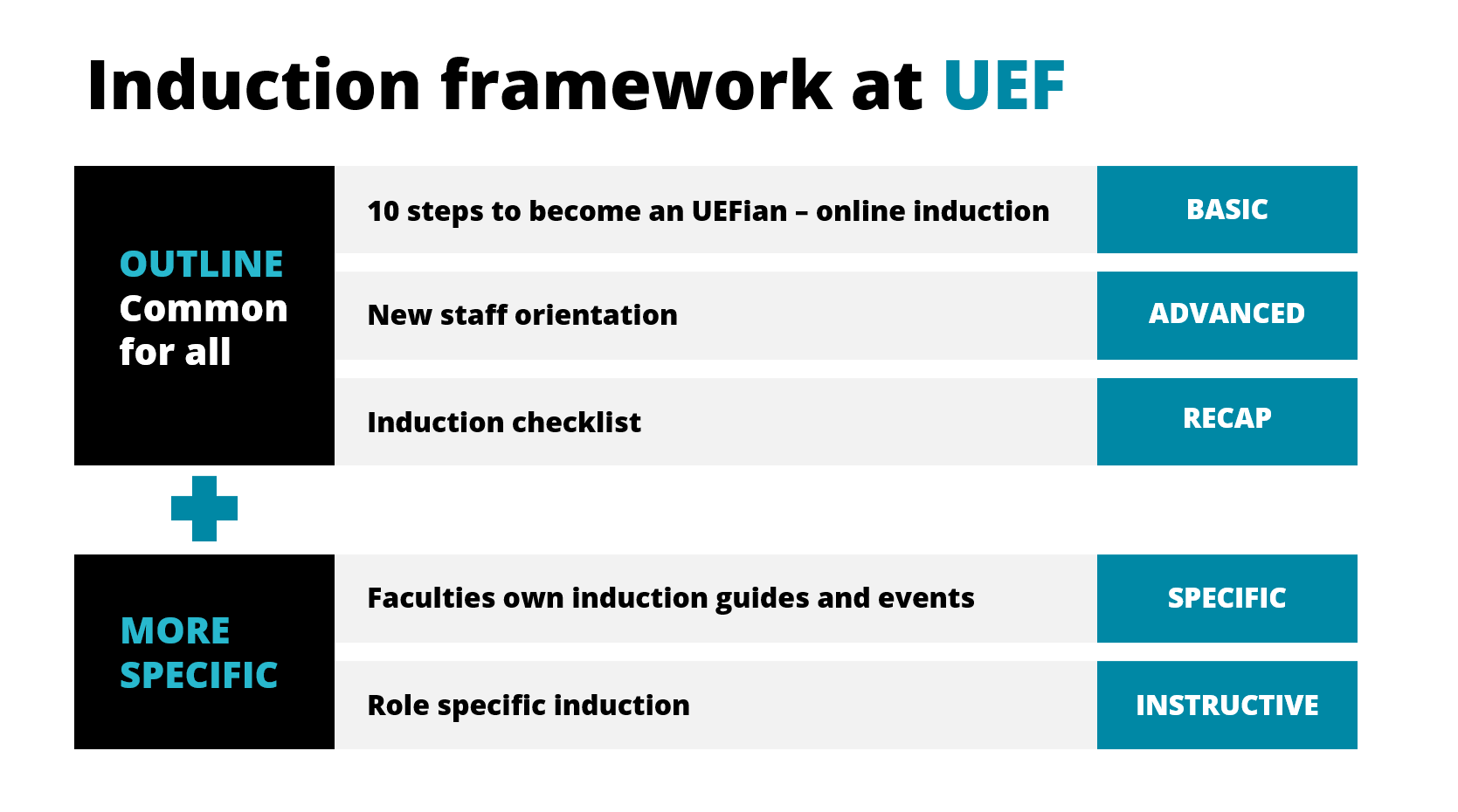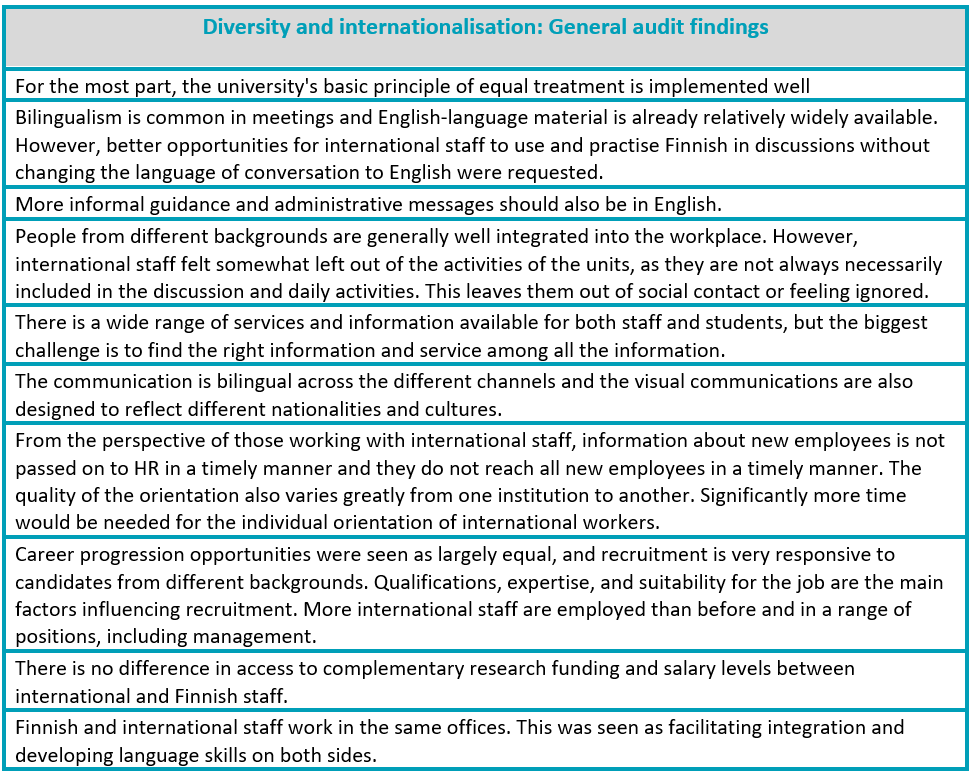Suitable and timely choice of topic
The audit team commends UEF for its choice of “UEF as a study and work environment for international students and employees”. The audit team thinks that this was a timely, relevant choice of topic that resonated with many of the individuals the audit team interviewed.
The SAR shows a high level of ambition in this area and that many steps have been taken in recent years to improve internationalization. Evaluating the experiences of international staff and students in university surveys and other evaluations is a positive activity that should be continued. The copious next steps identified by the university is a clear strength.
It was clear from interviews that is widely known across the university that internationalization is a goal at UEF. There was wide acknowledgement in the interviews that great progress has been made on internationalization in the recent past. Areas like the new language use policy and updated welcoming processes were highlighted as places where meaningful changes have been implemented. However, it was also clear that there are still many challenges facing international individuals studying and working at UEF. The process to internationalize the university, to make it an excellent place to work and study for all people, has begun well but is still in progress and some steps are still needed.
International staff see progress, but needs further support
The interviewed international staff valued their working relationship with the university. They recognized the work the university has done to become more international staff friendly in recent years. However, international staff still face many hurdles in their employment experiences. The audit team recommends that resources are allocated to improving the international staff experience, including continual monitoring, and improving of the international staff experience by leadership.
The first two years of Finnish language courses for staff were generally praised. However, language is still a barrier to participation in many areas of university governance. In interviews, international staff reported that the university-offered staff language courses were insufficient to bring language learners to a level of Finnish advanced enough to participate in governance and other activities at the university. This restricts their ability to engage and advance as employees at the university and hinders their integration into the community. Continuing advanced language trainings would not necessarily have to be expensive or complicated: mentoring arrangements, regular casual learn-professional-Finnish meetups, informal or formal tutoring, mutually beneficial paired language learning, and other mechanisms could allow the goals to be achieved efficiently and at relatively low cost. The audit team recommends UEF to enhance Finnish language learning opportunities for international staff.
The implementation of the new language policy was cited as encouraging internationalization. It allows everyone to participate in meetings and decision making regardless of language abilities. Some units, especially the student union, are doing excellent work: they provide interpreters for non-Finnish speakers or pro-actively decide the language of the meeting at the start of the meeting based on the abilities of the speakers present. The presence of multilingual materials was common, but continual improvement on this axis is important. Some unit members reported being essentially unable to participate in governance or other group work tasks due to language challenges. The audit team recommends UEF to ensure that all community members, regardless of language skills, can participate in decision making and governance. Sharing the best practices of the units already successfully implementing multilingual practices would be a good way to move forward.
The audit team considers it a strength that internationalization and diversity training is a component of management training. From the interviews the audit team learned that the workplace experiences of international staff were highly variable based on unit. Some units were exceptionally well integrated, developed to a point where internationalization was the norm and managers understood the challenges faced by international staff. However, in some units it was reported that this was not the case. Supervisors should know the importance of their role for international staff and understand the challenges international staff face. International staff friendly procedures should be integrating throughout the university. While all managers cannot be responsible for all components of an international staff member’s experience (housing, visa, health care, etc.), supervisors should know who to turn to for assistance in these matters.
Professional development opportunities for international staff are growing at UEF. However, some international staff reported a lack of ability to progress career-wise or seeing no career potential at the university due to their international status, despite reporting working hard to try to succeed. Some of the lack of ability to progress career-wise was due to language challenges, but other challenges were also cited. Some of the professional development opportunities are still in Finnish only. It was also reported that non-Finnish-speaking staff had reduced capabilities to participate in CV-building events. The audit team recommends UEF to enhance the professional developments to non-Finnish-speaking staff.
Attracting new international talent is vogue and attracts a lot of attention. Multiple international staff pointed out that retaining and supporting the international staff who are currently present does not receive a similar focus as new international staff. Staff felt that enhancing support for existing international staff would likely reap long-term rewards. Support both in the short term, like finding housing, helping with health insurance, visas, and language, and long term, like helping identify career paths and facilitating progression along them, were viewed as important.
While career security seems similar for international and Finnish individuals on the surface, the two groups do not experience career security in a similar manner. International staff often lack local support networks and may face serious ramifications if they lose employment contracts, such as expulsion from the country. The lack of employment security will lead, and reportedly has already led, to international staff leaving the university.
Employment security support is critical for the well-being of international staff, and this support needs to be maintained throughout employment relationships. Employment security challenges were reported in the audit visit even after multiple years of continuous employment and extremely hard work at integration. The audit team thus recommends the university explore avenues to enhance career progression opportunities and the career security of existing international staff.
International students have good experiences, but progress is still possible
Students reported general satisfaction with their programs, many caring faculty members and staff, and good overall experiences. International students praised the educational language skills of the faculty members and reported that excellent English language instruction and educational materials were provided. Teaching and learning methods were generally praised, with faculty described as approachable and characterized by a lack of hierarchy. The flexibility of the system, including of deadlines and program contents, was highly praised.
The educational model used in Finnish higher education institutions frequently requires independent planning and execution. However, some international students may not be used to this. They reported suffering from a lack of guidance in their studies and a difficulty adjusting to the Finnish system. Students requested more guidance when creating personal study plans and a reduction in the number of self-study courses, especially in core- and early-in-the-program courses. The audit team recommends that international students should have support as they transition to learning in the Finnish style. The structure of courses and programs targeted to international students should be evaluated to determine whether the course structures are optimal for them.
International students reported that individual meetings with their program coordinators were often extremely useful. However, at the same time, several students reported in the interviews that it was difficult to figure out who to approach with problems and that some pinballing of problems – being sent from person to person with no resolution – occurred. As identified in the university’s internal audits, there is a wide range of services and information available, but the challenge is to help students and staff find the right service or information. The audit team recommends that the university pursue techniques to facilitate international students and staff to find the services and information that they need. UEF should develop a system to regularly obtain feedback from international staff and students on this topic.
In the audit visit, students generally praised hybrid course offerings. Online, or at least hybrid, courses can provide flexibility for international students who may need, for example, to travel to other countries on short notice. In the interviews, some international students reported not wanting to take solely online courses. Thus, the audit team recommends continual evaluation of course modality in international programs. Modality is important to ensuring the success and well-being of students.
International students report that the welcome works well. The services for international students have been strengthened at the university. They still miss comprehensive career planning. Students reported a lack of support in finding jobs or internships. Others spoke of differences between opportunities at different campuses: international students at the Joensuu campus reported that there were fewer career-related events, as career fairs were mainly held in Kuopio. International students reported in interviews and the workshops that it was challenging to interact and form a community with native Finnish students despite a strong desire to do so. Some of them pointed out that the activities and social media accounts of the student groups are in Finnish. Therefore, they do not include international students who have limited Finnish skills. The audit team recommends better support and mentoring for international students, and more opportunities for them to meet Finnish students.
More international experience and intercultural competence for all students and staff needed
The audit team considers the university is ready to take the next step in internationalization: to regard international students and staff as integrated into the university community. To do this is to embrace international staff and students who are coming to the university as individuals who have an impact on the university, who will change and transform the university through their presence and experiences. Yet the audit team observed in interviews and workshops that the focus of the university was on how to integrate international staff and students into the existing university community, viewing them as an ”other” coming in who should be integrated into the existing culture. A more productive view could be that those in the university community gain and learn from the international staff and students and build a joint, hybrid culture that is neither wholly Finnish nor wholly international.
The audit team recommends that the university have a stronger focus on Finnish staff obtaining more international experience and intercultural competence. It could happen in interaction with existing international students and staff who are present at the university. It can also potentially happen through other mechanisms like staff mobility and student exchange.

